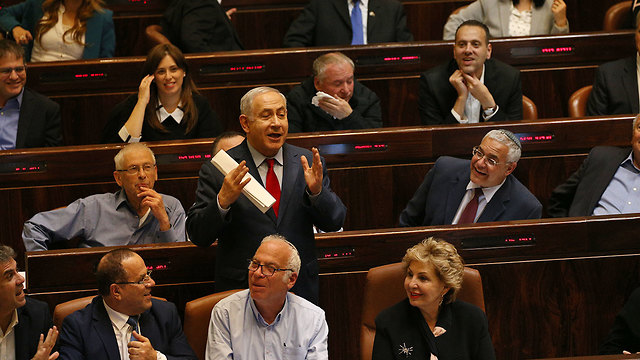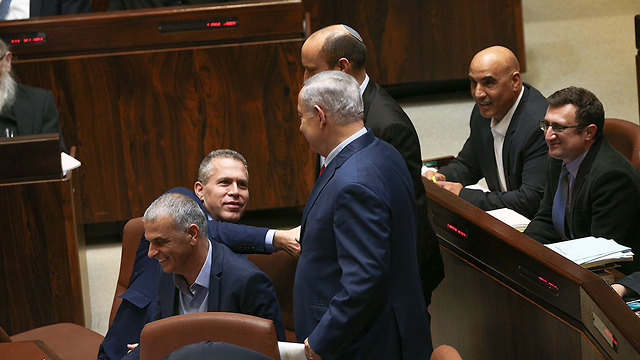

No one had Israel’s best interest in mind when solving coalition crisis
Op-ed: Don’t let them tell you stories about national responsibility and about responsible adults working behind the scenes out of concern for the Israeli public. We’re dealing with cynical politicians whose main concern is their seat, and when something threatens them—they charge themselves with super powers to save their skin.
Who says politicians aren’t influence polls? The way the political system acted Tuesday leads to the conclusion that polls may not always reflect reality, but that they have a tremendous ability to change it—and that’s what happened Tuesday evening.
And don’t let them tell you stories about national responsibility, and about the state’s best interest, and about responsible adults working behind the scenes out of concern for the Israeli public.

None of the players in the farce known as the “IDF draft law crisis” were driven by the state’s best interest when they did what they did. Neither the ones who brought about the crisis, nor those who went along with him or those who did everything in their power to solve it. We aren’t dealing with altruists here. We’re dealing with cynical politicians whose main concern is their seat, and when something threatens them—they charge themselves with super powers to save their skin.
The prime minister didn’t change his mind about calling elections because he thought it would harm the state. He changed his mind because he realized it could backfire on him. Flattering polls with 30 Knesset seats may be empowering, but not when it comes at the expense of those who are supposed to be your partners in the next government. Even 35 Knesset seats won’t help Netanyahu form a coalition if his partners are weakened or non-existent. And that’s what the polls commissioned by the television channels showed Monday evening: Coalition parties which barely pass the electoral threshold or are losing Knesset seats. And when these parties have no desire whatsoever to go to elections to begin with, it certainly leads to second thoughts.
It’s possible, however, that the picture was changed by something entirely different. Netanyahu was certain, based on past experience, that he would be the one to lead and decide on the election date because no one—mainly the opposition—would feel confident admitting that the date was unsuitable. After all, we would expect them to accept any date. When all Knesset members—apart from Yesh Atid and Meretz—supported the demand to hold the elections in October, it served as a main factor in thwarting the move. At one point, Netanyahu had only 46 Knesset members in favor of elections in June. The rest wanted October.
The prime minister’s first priority was to hold elections in June. If not in June, then he is better off without elections. And the worst thing, as far as he’s concerned, is elections in October. Half a year from now is a long time, an it’s uncertain that Netanyahu will manage to escape the attorney general’s decision in this timeframe. In that case, he should perhaps just stick to what he has and make the most of it rather than fight for something without knowing how it will end.

But the last push was provided by Avigdor Lieberman. The defense minister, who throughout the week gave the impression that he was willing to go all the way, making it seem as if he and Netanyahu had struck some rewarding deal, discovered on Tuesday that there was another stop on the way to the Defense portfolio in the next government. And if his number of Knesset seats following the elections would be similar to the number predicted by the polls, he might not even make it to the coalition agreement stage. Even for Lieberman, that was an overly dangerous gamble.
In the afternoon hours, he was already seen turning around and kicking the ball back into Netanyahu's court. Lieberman is no sucker. He has no intention of digging his own grave. On Tuesday, for the first time, he showed Netanyahu the way to solve the crisis so as not to go to elections.
We might never know about everything that took place between Netanyahu's two ears. Was it the poll, the date, or were there other things that changed his motivation to call elections? For example, the agreement worded by the coalition parties, which included a threat to reveal the fact that Netanyahu was dragging the state to elections simply because of his investigations. Perhaps it was their promise that they wouldn’t dissolve the government before the attorney general decided on a full indictment.
It doesn’t really matter. What we should know is how easy it is to drag a country to elections which would cost it billions, and how personal interests, the necessity to survive and political manipulations dictate this country’s agenda—and how easy it is to turn the tables.















